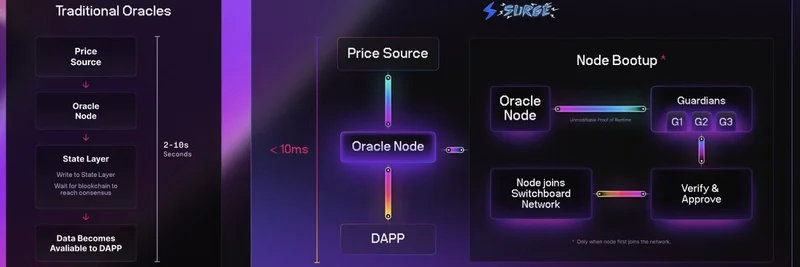Blockchains are amazing at tracking what's happening within their own ecosystems—like who sent what tokens to whom. But when it comes to real-world info? They're pretty much in the dark. Need to know the current price of ETH, the score of a big football match, or even if it rained in your city yesterday? That's where oracles come in. These are essentially bridges that feed external data into the blockchain so smart contracts can make decisions based on real-life events.
Unfortunately, most traditional oracles have some serious drawbacks. They're often slow, taking 2-10 seconds or more to deliver data, which is an eternity in the fast-paced world of crypto. They're expensive, centralized (meaning they're controlled by a few big players), and built by folks more interested in profits than innovation. This setup turns decentralized finance (DeFi) into something that still relies on "asking permission" from central authorities, which defeats the whole point of trustless systems. Worse yet, these flaws have led to billions in losses from hacks, delays, and manipulations.
That's the oracle problem in a nutshell, and it's one that doesn't get enough attention. But a recent thread on X from PixOnChain shines a light on it and introduces a promising solution: Switchboard.
What Makes Switchboard Different?
Switchboard, as highlighted in the thread, isn't just another oracle—it's designed to be permissionless and universal, meaning anyone can build on it without gatekeepers. This approach echoes the explosive growth we've seen in other tech revolutions, like personal computers or the internet, where removing barriers led to massive innovation.
Here's the kicker: Switchboard claims to be 300x faster and 100x cheaper than traditional oracles. It delivers price feeds in under 10 milliseconds, which is blazing fast. To put that into perspective, that's quicker than a blink of an eye, opening doors to applications that were previously impossible.
Take a look at the diagram from the thread. On the left, traditional oracles show a clunky process: data from a price source goes through an oracle node, then to a state layer where it waits for blockchain consensus, finally becoming available to dApps after seconds of delay. Switchboard flips the script with a node bootstrap system involving guardians and a switchboard network. A new node joins, gets verified and approved quickly, and data flows to dApps in under 10ms. It's efficient, secure, and doesn't require waiting for full blockchain consensus every time.
Unlocking New Possibilities in DeFi and Beyond
With this speed and cost efficiency, Switchboard enables some exciting use cases:
- Real-time risk engines: Monitor and adjust for risks instantly, preventing flash crashes or exploits.
- High-frequency trading strategies: Execute trades at speeds that rival traditional finance.
- Lag-free prediction markets: Bet on events without worrying about outdated data.
- Responsive blockchain games: Create immersive experiences where in-game events react to real-world data in real time.
The thread draws parallels to historical tech shifts. Cheaper microchips transformed computing, affordable bandwidth supercharged the internet—now, cheap and fast oracles could do the same for DeFi. It's not just about incremental improvements; it's about reshaping what's possible on blockchains.
The permissionless aspect is crucial too. Just like how app stores exploded when developers could easily publish, Switchboard aims to make oracle integration seamless for builders. This could accelerate adoption and spur a wave of new dApps.
The $SWTCH Token Launch
Adding to the buzz, Switchboard is set to launch its token, $SWTCH, on September 9th. While the crypto community might debate its valuation and short-term price action, the real story is the long-term impact. If Switchboard succeeds, users might not even notice it working in the background—trades will settle accurately, loans won't get unfairly liquidated due to delays, and the entire ecosystem becomes more reliable.
Of course, as with any new token, it's worth doing your own research. The thread mentions that Switchboard's partners are pushing this forward, and early adopters are already buzzing about its potential.
Community Reactions and Thoughts
The X thread sparked some interesting replies. Some users questioned if it was a paid promotion, while others expressed concerns about token launches overshadowing the tech. One commenter noted how they're using AI oracles in their project for unbiased market resolutions, showing real-world applications already in play. Overall, the sentiment leans positive, with folks excited about how this could evolve DeFi.
In the meme token world, where speed and data accuracy can make or break a pump, innovations like Switchboard could indirectly boost the ecosystem by providing better tools for traders and developers. If you're into blockchain tech, keeping an eye on Switchboard might just pay off—literally and figuratively.
For more insights on emerging crypto technologies and meme tokens, stick around on Meme Insider. We've got your back with the latest news and knowledge to level up your game.


